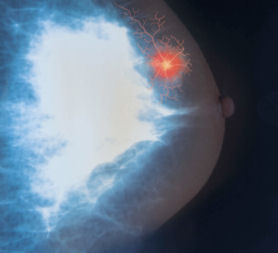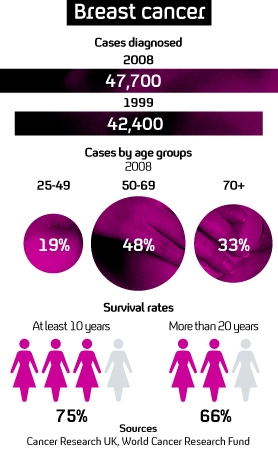Breast cancer risk rises to one in eight women
 Victoria Macdonald
Health and Social Care Editor
Victoria Macdonald
Health and Social Care Editor
Breast cancer cases are rising in the UK. Experts blame alcohol, obesity and later childbirth but one woman, who developed the disease, tells Channel 4 News no one can be complacent.

The biggest rise in breast cancer rates has been among women aged 50 to 69.
Over the decade, cases rose by more than 6 per cent in this age group while rates among younger women (25 to 49) dropped slightly by 0.5 per cent.
The lifetime risk of breast cancer has increased from one in nine women to one in eight.
Experts have blamed lifestyle factors, including obesity and drinking alcohol, for fuelling the rise.
“Women cannot change their genes but small changes in everyday habits can help to reduce cancer risk.” Sara Hiom, Cancer Research UK
Women are also more likely to have children later in life, and fewer offspring, which influences the risk.
Having a family history of the disease also increases a woman’s chance of developing breast cancer, which kills about 12,000 in the UK every year.
The latest data, from charity Cancer Research UK, is published on World Cancer Day.
Linda Milton from Glasgow was diagnosed with breast cancer when she was 50. She told Channel 4 News that even people who lead healthy lifestyles must not be complacent.
"I was diagnosed at my first screening. I was a good weight, fit,ate a low fat diet, only had the odd glass of wine and had breast fed four children.
"No one can be complacent. Breast cancer is no respecter of who you are. You could be the Queen or you could live in a gutter: breast cancer can affect anyone.
"There is nothing you can do about being female, a certain age or having a hereditary condition but you can help yourself in other ways and it's sensible to lead a healthy lifestyle.
"Also if only one person reads this and goes for breast screening it's worth it. People also have to know what's normal for them and report any changes they notice."
Survival rates
More women are surviving the disease, with almost two-thirds living more than 20 years beyond diagnosis.
More than three-quarters of women diagnosed with breast cancer survive for at least 10 years.
Sara Hiom, Cancer Research UK’s director of health information, said: “Women cannot change their genes but small changes in everyday habits can help to reduce cancer risk.
“Cutting back on alcohol by keeping within Government recommended limits of no more than 14 units a week (a small drink a day) helps.
Read more: Breast cancer - why are the numbers rising?

“Taking more exercise and eating a diet high in fibre but low in saturated fat can help maintain a healthy weight – which in turn reduces breast cancer risk.
“Women should also discuss hormone replacement therapy with their doctor as long-term use can raise breast cancer risk.”
The charity is also urging eligible women to go for screening.
Ms Hiom said: “Mammograms will pick up breast cancers early on before they can be felt as a lump or spotted through other visible changes.
“We know that the earlier a cancer is detected the more successful treatment is likely to be so women can benefit by taking up invitations to breast screening.”
Jane Maher, chief medical officer at Macmillan Cancer Support, said: “These figures confirm what Macmillan professionals are seeing on the ground, that breast cancer is continuing to increase.
“There is some good news in that earlier diagnosis and better treatments mean that more women are surviving their cancer.
“In fact, there are now almost 550,000 women living with a breast cancer diagnosis in the UK.
“Therefore it is vitally important that resources are better used to ensure women get the care and support they need to have a good quality of life after treatment.”




